1 What Is The Gospel Law?
A Summary Of The Teaching Video
Some of the points I cover in this teaching video:
What rule (or law) governs a believer’s conduct? There are four basic views in answer to this question:
(1) A believer is born again in order to walk with God according to his/her obedience to the law inscribed upon the heart—first, to love God supremely; second, to love one’s neighbor as himself/herself.
(2) A believer is born again in order to walk with God according to his/her obedience to the moral law—the ten commandments.
(3) A believer is born again in order to walk with God according to his/her obedience to the precepts and prohibitions of Christ and His apostles—this includes all the commandments recorded in the New Testament scriptures.
(4) A believer is born again in order to walk with God according to the obedience and righteousness of Christ, under the authority of the covenant of grace (the covenants of grace and redemption are the same covenant)—this is the soul’s union with Christ (regeneration), by virtue of which the life and graces of Christ flow into the soul, making the sinner alive unto God and enabling him/her to bear the fruit of his/her new nature in Christ (created in righteousness and true holiness). To walk in newness of life, or, in the “spirit” (new nature), is the same as walking with God according to the obedience and righteousness of Christ imparted to the soul in sanctification. (1 Cor 1:30; Rom 6-8; Gal 5)
Generally speaking, the Presbyterians, Reformed Baptists, 1689 Federalists, Dispensationalists and the New Covenant Theologists subscribe to one or more of the first three answers, all of which are based upon the believer’s obedience and righteousness to a written code of precepts/prohibitions. Although they often divide over the issue, at root level, they share the same view.
The fourth answer, however, is based upon Christ’s obedience and righteousness by virtue of a believer’s legal and living union with Him. His obedience and righteousness is imputed to the elect judicially (justification) and imparted to them spiritually (sanctification). Henceforth, the rule of conduct for a believer’s life is his/her spiritual union with Christ, having all the virtues of Christ flowing into his/her soul (among which are joy, peace, humility, gentleness, meekness, patience, faith, etc), expressing themselves in thought, word and action (good works). This “rule of conduct” is a living union with Christ rather than a legal code, and is called in scripture the “law of Christ”, or, as I often describe it, the “gospel law”.
The Apostle Paul wrote in Galatians 6:1: “Brethren, if a man be overtaken in a fault, ye which are spiritual, restore such an one in the spirit of meekness; considering thyself, lest thou also be tempted.” The expression, “ye which are spiritual”, is a reference to the new nature (the soul’s union with Christ), meaning that a regenerate sinner in a spirit of meekness is able to restore one who has been overtaken in a fault, because that virtue of Christ (meekness) flows into his/her soul. Henceforth, the Apostle continues in verse 2: “Bear ye one another’s burdens, and so fulfil the law of Christ.” That is, the “law of Christ” (spiritual union) is fulfilled when the regenerate sinner works out in thought, word and deed, what the Spirit of God works in by virtue of the soul’s union with Christ. The “law of Christ” is a living union, not a legal code.
Jared Smith, Muntinlupa, PH (29/10/2022)
An Outline Of The Teaching Video
The Meaning Of The Gospel Law
The Major Views On Which Law Should Govern The Believer’s Life
The Heart Law
The Moral Law
The Law Of Christ
The Gospel Law
The Distinguishing Features Of These Laws
The Nature Of A Law
The Nature Of A Covenant
The Nature Of Relationships
The Husband And Wife
The Parents And Children
Friendships
The Nature Of Relational Conflicts
The Laws And Their Covenants
The Heart Law, Under The Covenant Of Works
The Moral Law, Under The Mosaic Covenant
The Law Of Christ, Under The (Supposed) New Covenant
The Gospel Law, Under The Covenant Of Grace
The Covenant Of Grace
The Major Groups Subscribing To The Various Views On Which Law Should Govern The Believer’s Life
The Heart Law And The Moral Law—Arminians, Presbyterians And Reformed Baptists
The Law Of Christ—Dispensationalists And New Covenant Theology Advocates
The Gospel Law—High Or Hyper-Calvinists
Identifying The Essential Differences Between The Major Views On Which Law Should Govern The Believer’s Life
The Heart Law And The Moral Law—A Sinner Is Born Again In Order To Walk With God According To His/Her Obedience To One Or The Other Of These Laws
The Law Of Christ—A Sinner Is Born Again In Order To Walk With God According To His/Her Obedience To The Precepts And Prohibitions Of The New Testament Scriptures
The Gospel Law—A Sinner Is Born Again In Order To Walk With God According To The Obedience And Righteousness Of Christ
The Framework Of Sovereign Grace
The Electing Love Of God The Father
The Covenant Of Works—Sin Is Judicially Imputed (Condemnation) And Spiritually Imparted (Corruption)
A Plan Of Salvation Devised For The Elect
The Redeeming Grace Of God The Son And The Sanctifying Power Of God The Spirit
The Gospel Law Is Under The Jurisdiction Of The Covenant Of Grace
A Comparison Between The Major Views On Which Law Should Govern The Believer’s Life
A Final Word
An Automated Transcript Of The Teaching Video
I’d like to invite you to take your Bible. We’re looking at Galatians chapter 6 and I’ll be reading for you the second verse. While you’re turning there, let me make a comment about the unpolished onscreen notes. If you follow my teaching ministry regularly, you’ll know that I have more polished notes than the ones you see on the screen. This week and probably the next three to four weeks after, I’m going to be extremely busy and I just don’t have the time to make the regular preparations I usually give to these recorded teachings, and so I’ve opted to continue using onscreen notes, but I’m afraid you’re going to have to put up with my handwritten notes, and I’ll be making them as we move through the teachings. I can only hope it’ll be as effective as if I had the notes a bit more polished.
The Meaning Of The Gospel Law
Now, you’ll notice the title I’ve given to this study—What Is The Gospel Law? This question was put to me by a pastor who recently visited my teachings uploaded to the Association of Historic Baptists. He was wondering what I meant by the expression, “the gospel law”. I wasn’t intending to provide a public answer to that question, however, it’s this subject that’s been revolving in my mind for a couple of days, and now that I’m at the end of the week and I have to have a teaching prepared for tomorrow, I feel that this is probably the best topic to tackle or handle given that it’s the one thing I’ve been thinking about.
Well, as I’ve said, we’re looking at Galatians chapter 6 and I’d like to read for you verses 1 and 2, but verse 2 will be the focal point. These are the words of the Apostle Paul: “Brethren, if a man be overtaken in a fault, ye which are spiritual, restore such an one in the spirit of meekness, considering thyself, lest thou also be tempted. Bear ye one another’s burdens, and so fulfill the law of Christ.” Do you see the expression, “the law of Christ”? In a nutshell, when I use the language, “the gospel law”, I mean by it one and the same thing as the expression used here in Galatians chapter 6, for the law of Christ. The law of Christ and the gospel law in my view are the same thing. Having said that, not everyone interprets Galatians chapter 6 and verse 2 in the way that I do. In fact, most people don’t interpret it the way that I do. And that’s going to create a little bit of confusion still, on what is meant by the gospel law or the law of Christ. So for this study, I’d like to share with you my view on the subject. And I will begin by highlighting for you the major views taken when it comes to the subject of a law that governs the Christian’s life.
The Major Views On Which Law Should Govern The Believer’s Life
The main issue is this—what rule, or what law, governs a believer’s conduct? That is, after a sinner has been born again, then what law should he or she be following or obeying as he or she walks with God in newness of life?That’s the big question and there tends to be four general views on the topic. I’m just gonna highlight for you the different laws that people believe Believers are governed by. The first of these would be the heart law; the second, the moral law; the third, Christ’s law; and the fourth, the gospel law. What do these mean?

The Heart Law
Well, when we speak of the heart law, we’re talking about that law that God has inscribed upon the hearts of men and women. When God made Adam and Eve, and place them in the garden, He inscribed upon their hearts a law—it’s a two-fold law. First, love God supremely; and second, love one’s neighbor as one’s self. And that same law is inscribed upon all of the hearts of men and women coming into this world. I therefore call it the heart law.
The Moral Law
When we talk about the moral law, this is the law that God gave to Moses for the children of Israel as a nation. Now, this is only one part of a much larger law given to them. You’ll remember, for instance, another part of that law was the civil law; another part was the ceremonial law; and then, of course, there is the moral law. And the moral law often goes by the name, the ten commandments. And you see, a lot of people believe that a sinner is born again in order that he or she might walk with the Lord by obeying the ten commandments, or the moral law.
The Law Of Christ
When it comes to Christ’s law, well, we read of that expression in Galatians chapter 6 and verse 2, and this group of people believe that the previous laws—that would be the heart law and the moral law—these laws were done away with, or better expressed, these laws were fulfilled by Christ during His earthly ministry. And when Christ died at Calvary, He replaced these first two laws with this third law—the law of Christ. In essence, they believe the law of Christ is the precepts and the prohibitions given by Christ and His Apostles in the New Testament scriptures.
The Gospel Law
And then, when we speak of the gospel law, what I mean by this expression is one’s union with Christ—the soul’s union with Christ, by virtue of which the life and graces of Christ flow into the soul. The gospel law.
The Distinguishing Features Of These Laws
So, in a nutshell, that’s the basic meaning of these laws, and you see, depending on who you’re talking to, they will believe that when a sinner is born again, he or she is born again in order to walk with God according to their obedience either to the heart law, or to the moral law, or to Christ’s law. Or, a sinner is born again in order to walk with God according to the obedience of Christ and His righteousness, which of course, would be the gospel law. Well, how do we unpack these laws? How do we make sense of them?
The Nature Of A Law
Realize, that when we speak about a law, a law doesn’t exist unto itself. A law exists under the jurisdiction of something called a covenant. Without a covenant there is no law. And in fact, if there is no law, there is no covenant. The two go hand in hand. And therefore, to make sense of these different laws, we have to understand the jurisdiction under which they are governed. Before I share with you the different covenants under which these laws are governed, let me give a little snippet, or overview, of a covenant.
The Nature Of A Covenant
We speak of a covenant, and it’s a word that’s not unfamiliar to us, but it’s not something we use in everyday vocabulary either. What exactly is a covenant? Well, if you were to watch the teachings of let’s say, a Presbyterian, or Reformed Baptist, or even a New Covenant Theology advocate, or a Dispensationalist—I tell you, they all confuse the subject, all of them. They seem to get tripped up or hindered by over complicating the issue. Please listen to me, I’m going to give you a very simple definition, and this definition is generic so that it covers any and all covenants ever made throughout history. Please listen to it:
A covenant is an agreement between two or more persons, with certain obligations binding them together.

That is a generic, comprehensive and accurate definition of a covenant. A covenant is an agreement between two or more people, with certain obligations binding them together. Now, watch. I’m using the word obligations. Another word for obligations might be duties—a covenant is an agreement between two or more persons, with certain duties binding them together. Can you think of another word that might also be used for obligations? How about responsibilities? A covenant is an agreement between two or more persons, with certain responsibilities binding them together. Can you think of another word that might also be used with reference to obligations? How about the word law? A covenant is an agreement between two or more persons, with certain laws binding them together. Do you see now, why a few moments ago I said every law exists under the jurisdiction of a covenant? Where there is a covenant, there is a law; and where there is a law, there is a covenant. I hope you’re capturing the idea. It’s very basic, but it’s something that we often don’t think about; we don’t work out these issues very far.
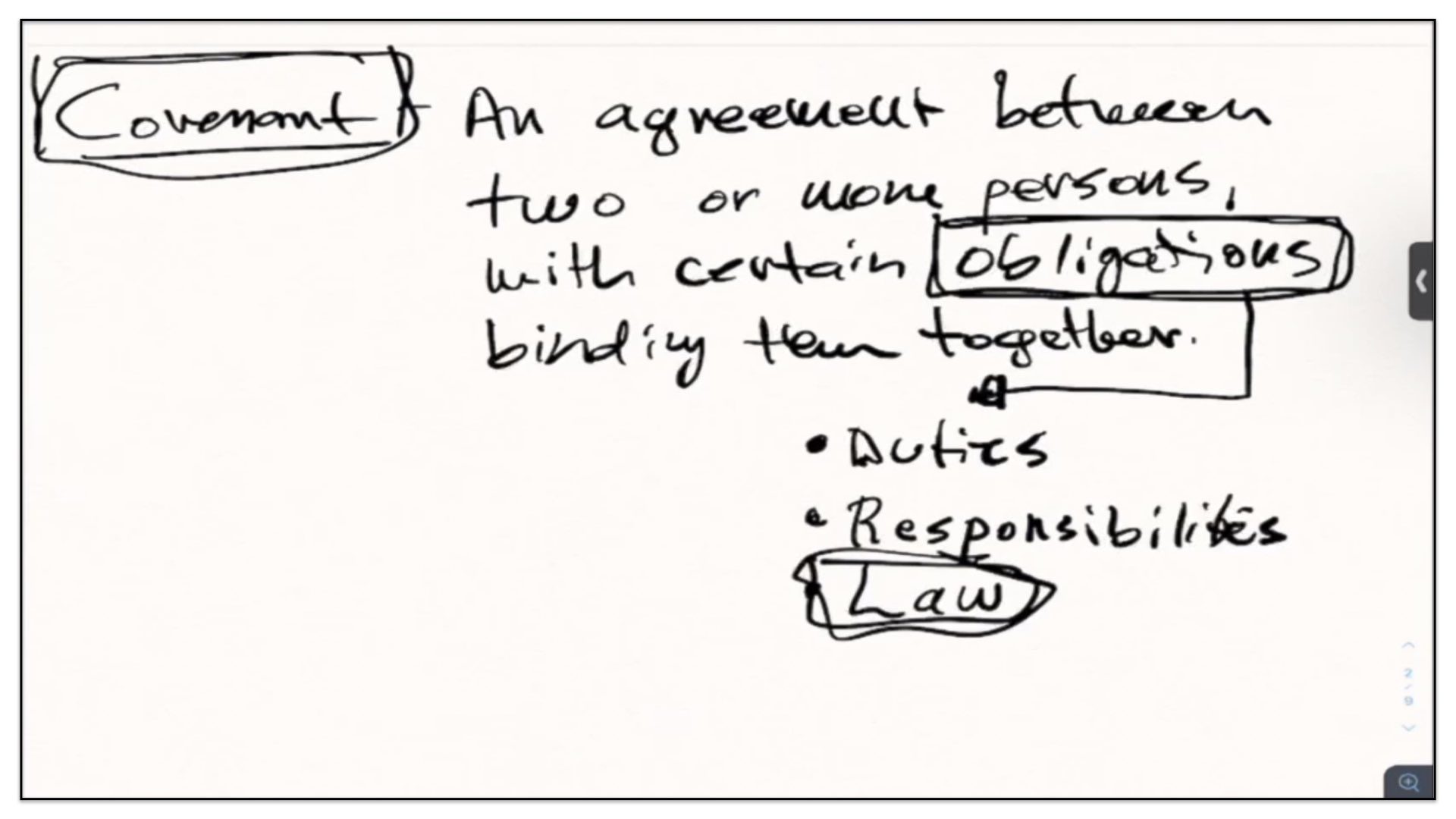
Let me add something more to this. If you were to listen again to let’s say, a Presbyterian or a Reformed Baptist, or some of these other groups, they’ll tell you a great deal about the covenants. But it seems they often skip the most basic issue of all when they come to the subject of a covenant. Here’s the issue. What is the significance of a covenant? Why is it important? What’s the significance of it? Please watch this:
The Nature Of Relationships
Every relationship is based upon the authority of a covenant.
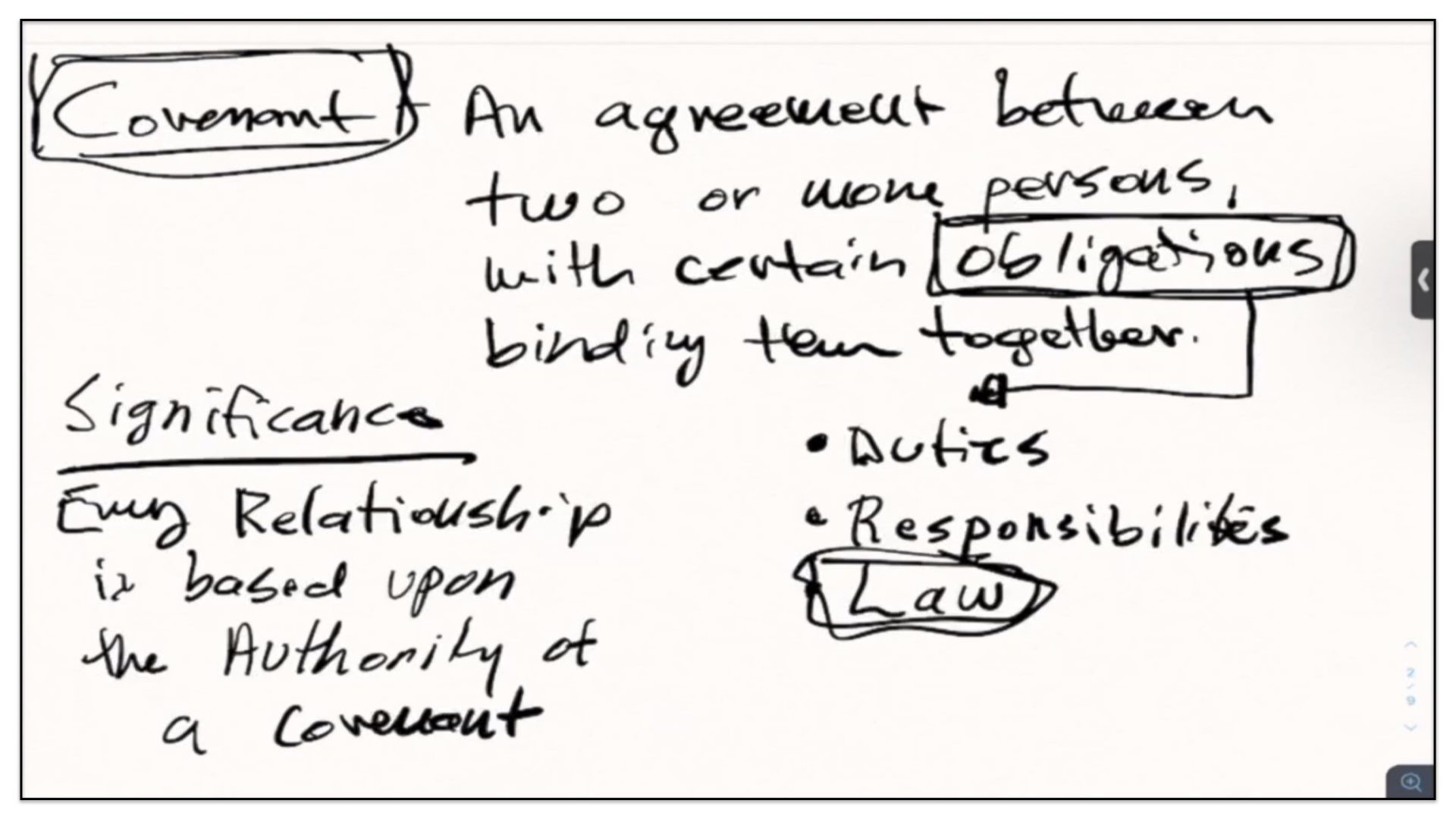
Every relationship is based upon the authority of a covenant. Think of the meaning of a covenant—an agreement between two or more persons, with certain obligations or laws binding them together. The jurisdiction of a relationship is the covenant, it’s the agreement, that binds them together. Each of the persons within that agreement have certain expectations of one another that have to be met. Let’s just give some examples of this.
The Husband And Wife
Take, for instance, the man and the woman who choose to get married. Well, they exchange their wedding vows, and they enter a marriage covenant, an agreement. The vows they exchange are their obligations. That’s the laws by which they’ve come together as a husband and wife. They’ve promised and obligated to each other to love one another and stay with each other through sickness and in health, rich or poor, etc. Do you see, the husband and wife are bound together—their relationship—by a covenant; this agreement and expectations between them both. The husband expects certain things of the wife; the wife expects certain things from the husband. That’s the law which binds those two people together within the agreement.
The Parents And Children
Now, take another example—parents and children. So, this is a covenant that’s never spoken. Never does a parent sit down with the children and say, “Right, here’s the agreement with all of the house rules and laws that bind us together.” It’s an unspoken and unwritten agreement between parents and children. But the obligations are innate—they’re just known by both parties. For example, the parents expect the children to obey and to reverence mom and dad. It’s a basic expectation, or obligation, on the part of the children. And likewise, the children have a natural expectation that mom and dad are going to love them unconditionally. And with that love is going to come things such as shelter, and clothing, provisions. Even discipline! Children need and even want discipline. They do! Discipline is an expression of a parent’s love, and you see, those expectations from the parents’ side, and then from the children’s side, that’s the obligations or laws that bind parents and children together.
Friendships
And you get the same thing with friends. Take one of your best friends, for instance. You’ve never sat down with that person, drawn up an agreement or a contract and spelled out the expectations you and that person have towards each other. But you both certainly have expectations of one another. I mean, you expect your friend not to lie to you; not to steal from you; not to slander you. And, if your friend were to do any of those things, what happens to the relationship? Conflict. Relational conflict.
The Nature Of Relational Conflicts
Where does the relational conflict come from? It comes from one or more of the persons within the agreement transgressing the law. Transgressing the expectations, and therefore violating the agreement, or the covenant that binds the people together within that relationship. And of course, the end result of the relational conflict can be one of two things. Either first, separation—complete separation. A relational conflict that cannot be resolved, meaning the two persons cannot be reunified, the only solution is for them is to remain divided. And one person goes his way, the other person goes her way. The other way to resolve a relational conflict is through reconciliation. Reconciliation is when the two or more parties of that covenant, or relationship, come together and they yield to one another; they confess their faults, forgiveness is given and the relationship is restored. And those obligations are also restored and the relationship is able to move forward.
And you see, if you apply those principles between parents and children, same thing—relational conflict is the result of either the parents or the children failing in their obligations towards the other. Same with husband and wife—conflict between a husband and wife is the result of the husband and/or wife failing in their obligations, or expectations, or the laws that bind the man and woman together in the marriage union.
Now, that is an overview of what a covenant is and the significance of a covenant, which then leads me back to where we began with these four laws. I would like now to fill in for you under which covenants these laws belong.

The Laws And Their Covenants
The Heart Law, Under The Covenant Of Works
When we speak about the heart law, we’re referring to something called the covenant of works. Now, that’s a covenant God made with Adam in the garden of Eden—the covenant of works.
The Moral Law, Under The Mosaic Covenant
When we speak of the moral law, we’re now speaking about something called the covenant of Moses, or, the Mosaic Covenant. And this is a covenant God made with Moses.
The Law Of Christ, Under The (Supposed) New Covenant
And then, when we speak about Christ’s law—at least those who speak of Christ’s law within this third category as I’ve described it—this would fall under what they call the New Covenant.
The Gospel Law, Under The Covenant Of Grace
And then for the gospel law. The gospel law comes under something called the covenant of grace.

Now, pause there for a moment so I can make clear what I mean by the covenant of grace.
The Covenant Of Grace
Presbyterians and Reformed Baptists use this language—covenant of grace—in a very different way than I use it. When I speak of the covenant of grace, I’m referring to the covenant of redemption—it’s the same thing. You see, there is something called the covenant of redemption which refers to an eternal covenant between the three Persons of the Godhead. The Father in electing love, the Son in redeeming grace and the Spirit in sanctifying power agreed to save Their people from their sins. That is an eternal or everlasting covenant. In fact, the scriptures referred to it as an everlasting covenant. It’s also called in scripture the covenant of peace, because it’s a covenant where God makes peace between Himself and His elect people, the sinner. And we sometimes will call that same covenant the covenant of grace. So, when I say covenant of grace, I’m talking about an agreement between the three Persons of the Godhead, Father, Son and Spirit, on behalf of the elect sinner. When Presbyterians and Reformed Baptists use this language—covenant of grace—they actually distinguish between the covenant of redemption and the covenant of grace. They believe the covenant of redemption is that everlasting covenant between the Father, Son and Spirit, but they place that covenant, as it were, in the backdrop of God’s master plan for the ages. And then they view God working out that covenant of redemption in history through the covenant of grace. And that’s at least one of the covenants that God apparently works out the covenant redemption in history. And they therefore view the covenant of grace as being an agreement that God makes with the sinner, the obligations of which are faith and repentance. So they think the covenant of grace is God saying to the elect sinner, “Believe on the Lord Jesus Christ, repent of your sins, and you’ll be saved…that’ll be our agreement…that’s our contract…your obligations are faith and repentance, My obligations are then to save you…all based on the covenant of redemption.” And you see, I reject that view! I don’t believe the covenant of grace is a different covenant from the covenant of redemption—they’re one and the same. God doesn’t make an agreement with the sinner. Rather, God makes an agreement with Himself on behalf of sinners. That’s the difference and that’s what I mean by the covenant of grace.
The Major Groups Subscribing To The Various Views On Which Law Should Govern The Believer’s Life
The Heart Law And The Moral Law—Arminians, Presbyterians And Reformed Baptists
Okay, now watch. Let’s break this down a little further. Who are some of the people who might take the first two laws and say that this is the rule that governs a believer’s life? Well, among these groups, and I speak only in general terms here. So look, if I put a group down here on the online notes and you belong to that group and I haven’t represented your view correctly, don’t get angry with me. I’m only speaking in broad terms. If you’re an exception to the rule, well that exception proves the rule, and I hope you’ll give me a little leave way as I bring out the teachings. Among those that would believe that the heart law or the moral law are the rules that should govern a believer’s life, would be Arminians. They generally believe that. They believe when a person is born again, he/she is now obligated to obey God—to be righteous—by keeping one of these two laws. You might be surprised to see them placed in the same grouping, but the Presbyterians also believe that. They believe that once a sinner is born again, he or she is now under obligation—the duty—to walk with God by obeying, usually they believe it’s the moral law, sometimes they bring it back to the heart law. And listed with the same groups I would also put the Reformed Baptists. They believe the same thing. Now, there’s other groups to list, but I’ve only mentioned these because, well, they tend to be groups that we rub shoulders with more often than the others. So, that would be the heart law and the moral law.

The Law Of Christ—Dispensationalists And New Covenant Theology Advocates
What about the New Covenant, Christ’s law? Well, generally speaking, I would place in this category the Dispensationalists. And, I would also place in the category the New Covenant Theology guys. Now, to be honest, it’s a bit unclear to me as to which category they belong. I have read and have also watched and listened to different teachings from these guys and they certainly do hold generally to this view. But there have been some who reference this last view that I hold to. So, you know, there might be some New Covenant Theology guys that would also be close to my view on the subject, but when I say close to my view, look, New Covenant Theology—some of you might not even know what that means—that has more relationship with Dispensationalism than it does with Covenantalism (with the Presbyterians and the Reformed Baptists). Now, they would dispute that. Generally speaking, the New Covenant Theology guys think they have more in common with Reform Theology, but that’s not true, at least in my view. They carry a lot of baggage from Dispensationalism with them and I think it hinders them in their views on the gospel. And so that has to be taken into account. Even if the New Covenant Theology guys embrace a view similar to mine, it’s not going to be exactly the same, I can guarantee that!
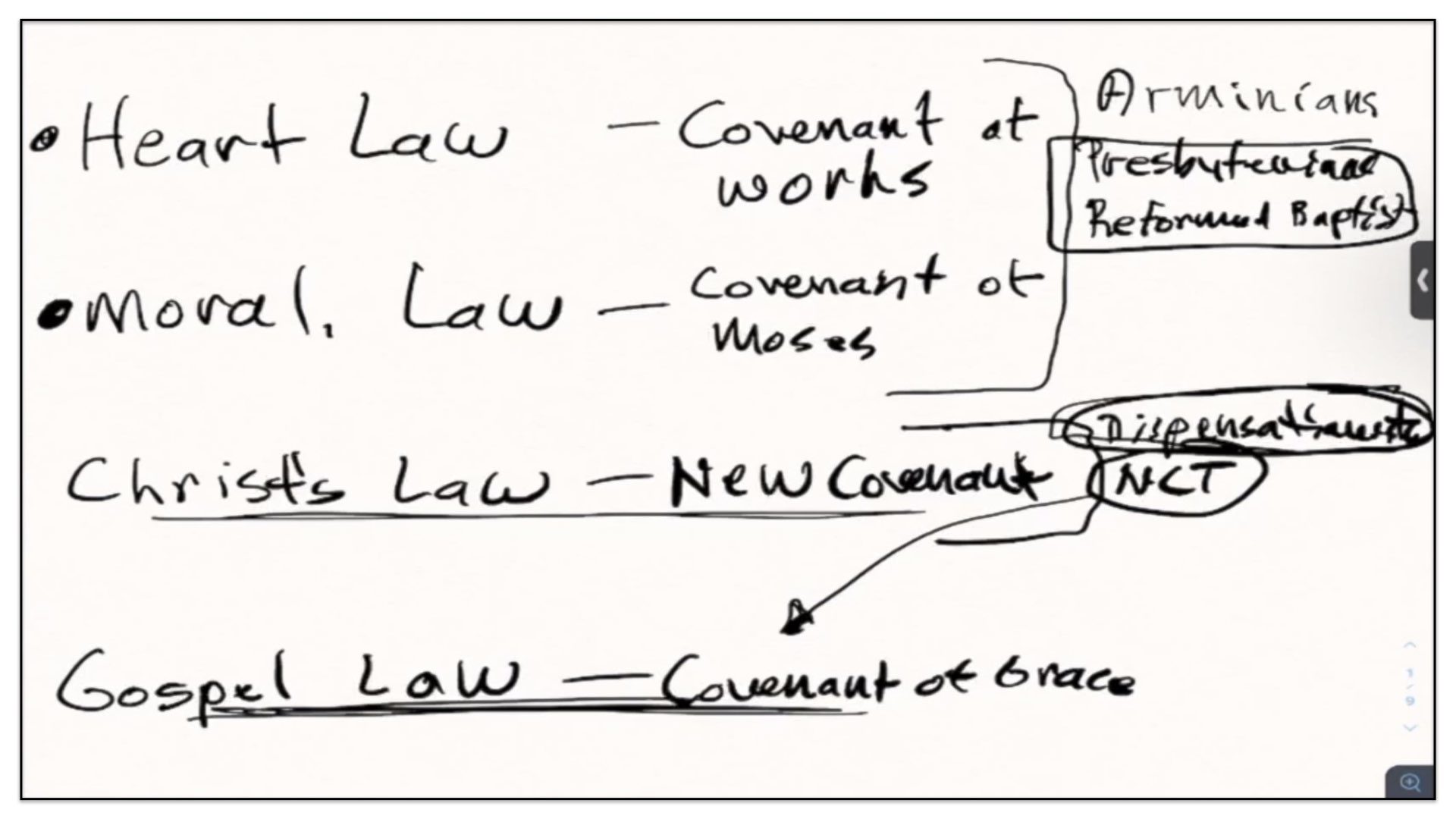
The Gospel Law—High Or Hyper-Calvinists
Well that then brings me to myself. What am I? Well, I’m just gonna identify myself as a High or Hyper-Calvinist. Now look, I don’t represent all High or Hyper-Calvinists. I know a lot of High-Calvinists that will not embrace the view that I take on the issue. But, the view that I do take is based on a high view of sovereign grace and that’s why I’ve identified myself with that language.
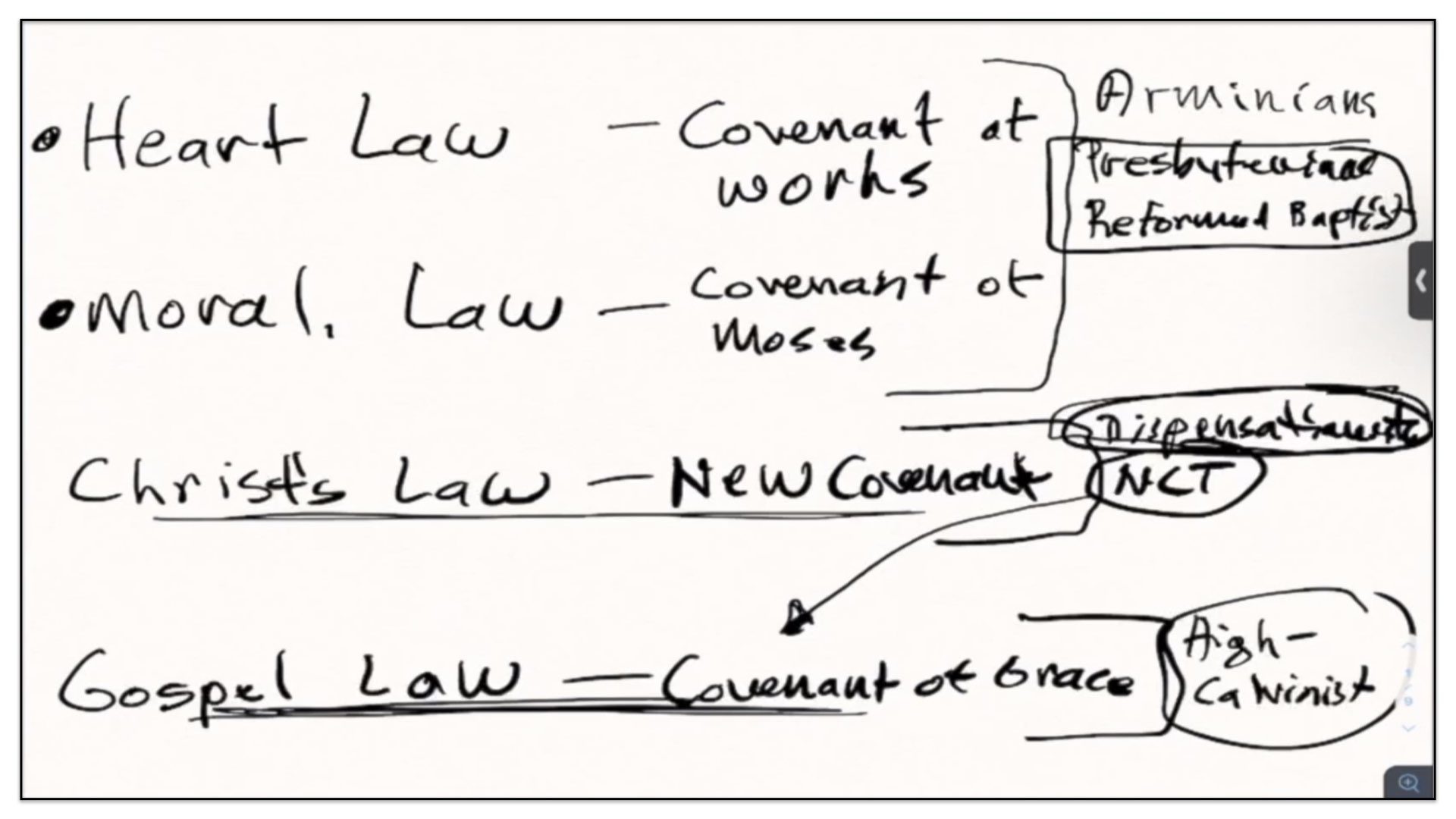
So, that gives you some idea now, generally speaking, on the different groups that hold to these views. Now, I’m gonna add something more to the list. Watch. Let me just change the color pen so we can distinguish the next set of notes. Watch.
Identifying The Essential Differences Between The Major Views On Which Law Should Govern The Believer’s Life
The Heart Law And The Moral Law—A Sinner Is Born Again In Order To Walk With God According To His/Her Obedience To One Or The Other Of These Laws
Let’s take the first two laws. These people believe that a sinner is born again in order to walk with God according to his or her obedience (righteousness) to either the heart law or the moral law. So, it’s all about the sinner’s obedience and righteous. Now, I know the sinner’s been born again, so, a new nature’s been imparted and that’s what makes the difference for this group of people. They think, “Well, before the new birth, they could not keep the heart law or the moral law. But after the new birth, with the new nature now, they can keep it. They’re enabled to keep it!” And that’s the view. They think a regenerate sinner is now able and responsible in his or her obedience to walk with God.
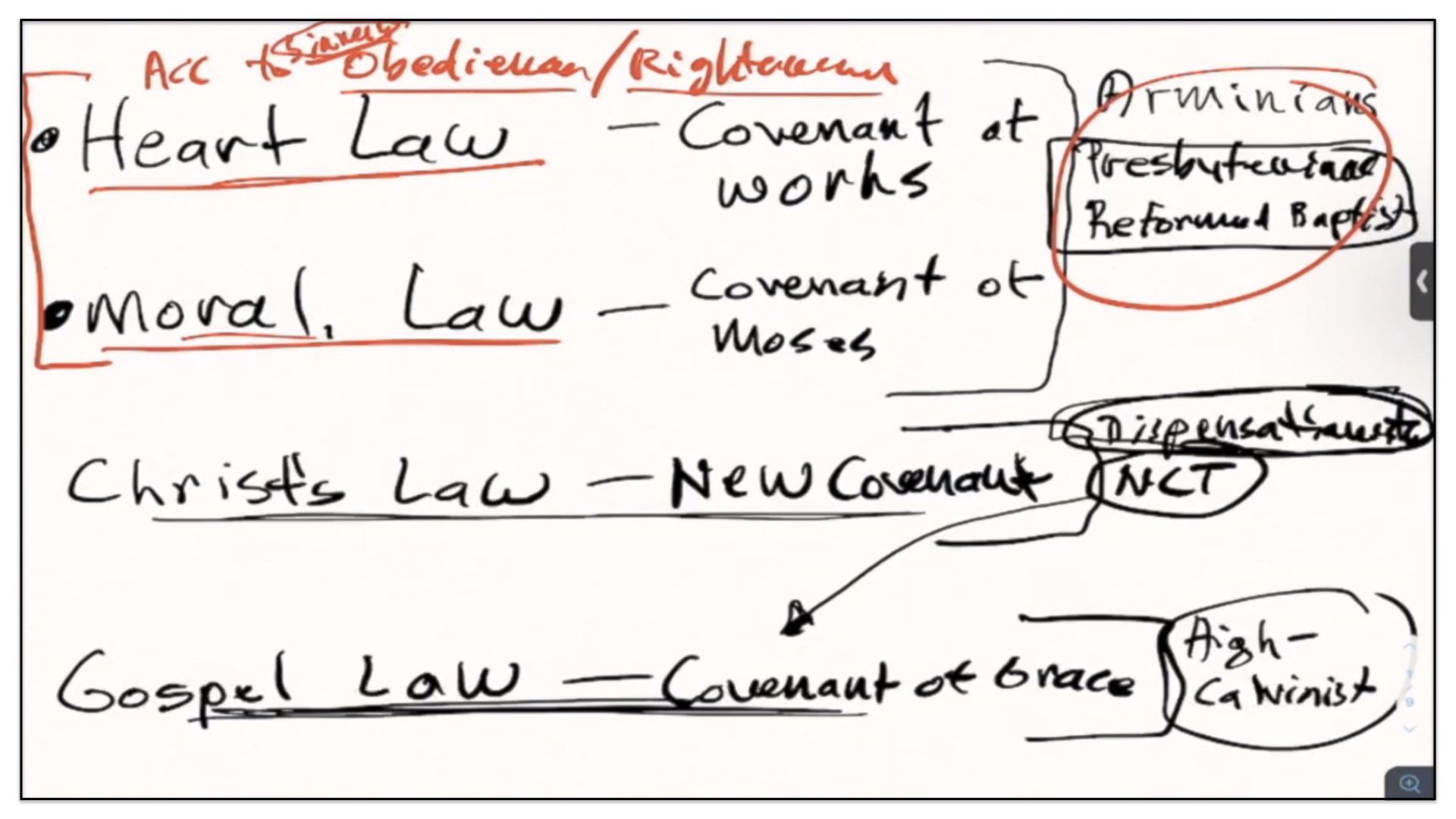
The Law Of Christ—A Sinner Is Born Again In Order To Walk With God According To His/Her Obedience To The Precepts And Prohibitions Of The New Testament Scriptures
Come to this third View. They believe precisely the same thing. They believe that a sinner is born again in order to walk with God according to his or her obedience by keeping Christ’s law—the precepts and prohibitions of the New Testament scriptures.

The Gospel Law—A Sinner Is Born Again In Order To Walk With God According To The Obedience And Righteousness Of Christ
Come to the fourth view—my view. I believe a sinner is born again in order to walk with God according to the obedience and righteousness of Christ. And you see, there’s a very important distinction between the first three views and the fourth view. In the first three views, it’s all about the sinner’s obedience after the new birth—born again in order to walk with God by personally obeying (keeping) the heart law or the moral law. So it’s the sinner’s obedience in sanctification. Whereas according to my view, a sinner is born again in order to walk with God according to the obedience and righteousness of the Lord Jesus Christ. It’s the obedience and righteousness of the Lord Jesus Christ that is the believer’s sanctification.
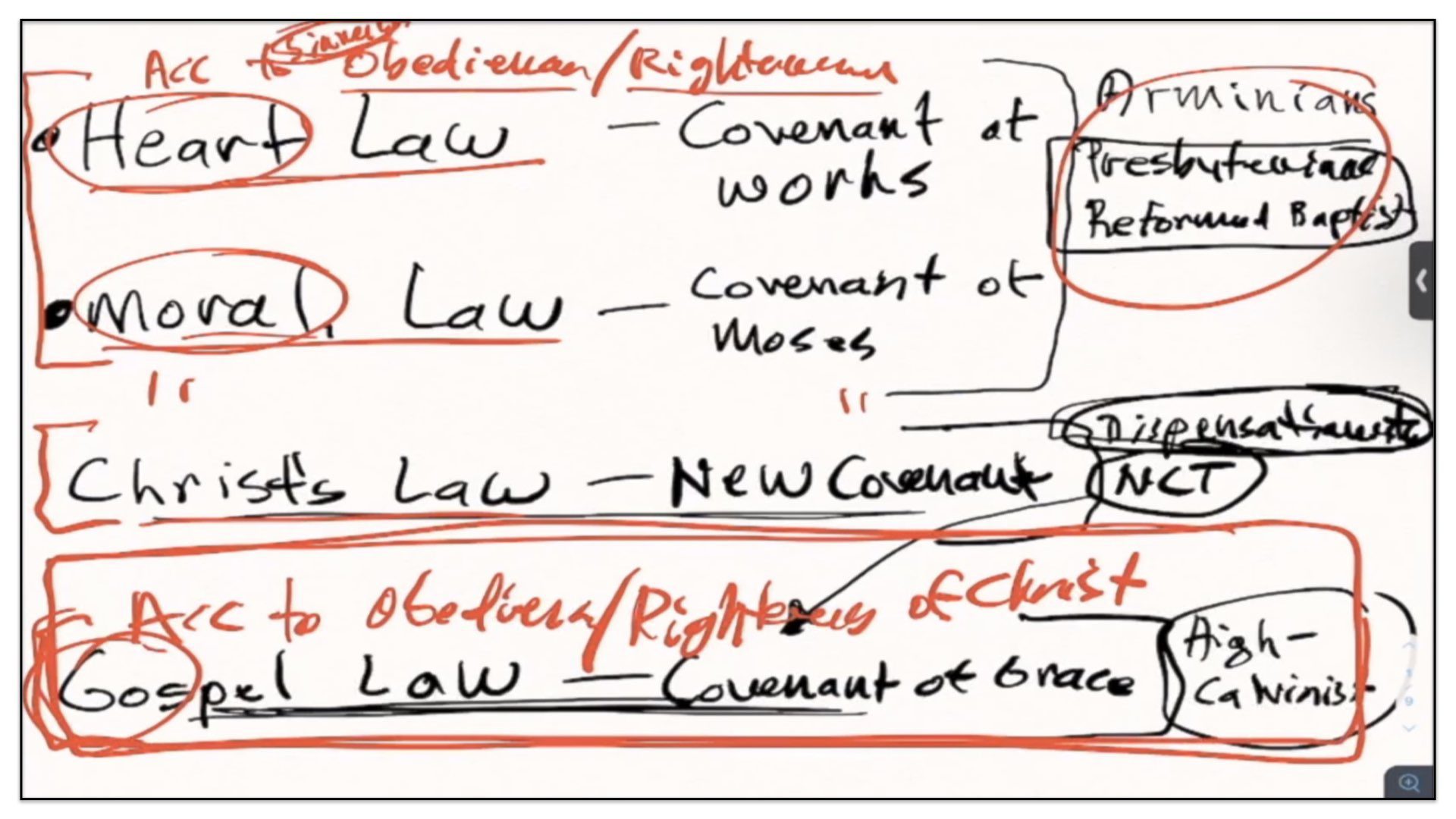
Now, I know it’s taken me some time to get to this point in the teachings. But I hope at this stage you can begin to see—as we pull apart the knots of the problem, if you like—and you begin to see more clearly the distinctions between these three views. Now, what I would like to do is take all of this a step further, and I want to emphasize for you what it is I believe about the gospel law. And I’m gonna be referring you to the Framework of Sovereign Grace.
The Framework Of Sovereign Grace
Now remember, this is the definition of a covenant I just gave a few moments ago.

And now, let’s take a look at the Framework of Sovereign Grace. I don’t have the polished onscreen notes, so it’s all gonna have to be diagrammed out by hand. Bear with me as we work through this together. Watch.
The Electing Love Of God The Father
The Framework of Sovereign Grace begins with the Triune Jehovah. We believe God exists in three distinct Persons—the Father, Son and Spirit. And, from eternity, God the Father envisioned the entire human race, out from which He chose a people as special objects of His love. They’re identified in the Word of God as the elect. And, He set aside the others as objects of less love. And although they’re never identified as the non-elect, they are called reprobates. So, we have both the doctrine of election and the doctrine of reprobation from the very beginning of this Framework.

Having made this choice, it pleased the Father to bring the human race into existence by creating a time continuum in which they would live. Now, that’s a timeline at the bottom of the notes and the reason it’s in the form of a triangle, with God at the top, is because God is eternal, and He is therefore outside of the sphere of time. Having chosen to bring the human race into a time continuum, it also pleased the Father that He would create a special habitation for them—a world. And it would be in this world that the Father would bring both the elect and the non-elect. Now, so far so good. That’s the basic framework on how God has chosen to distinguish two groups, or members, of the human race; and then how He’s chosen to bring them into existence.
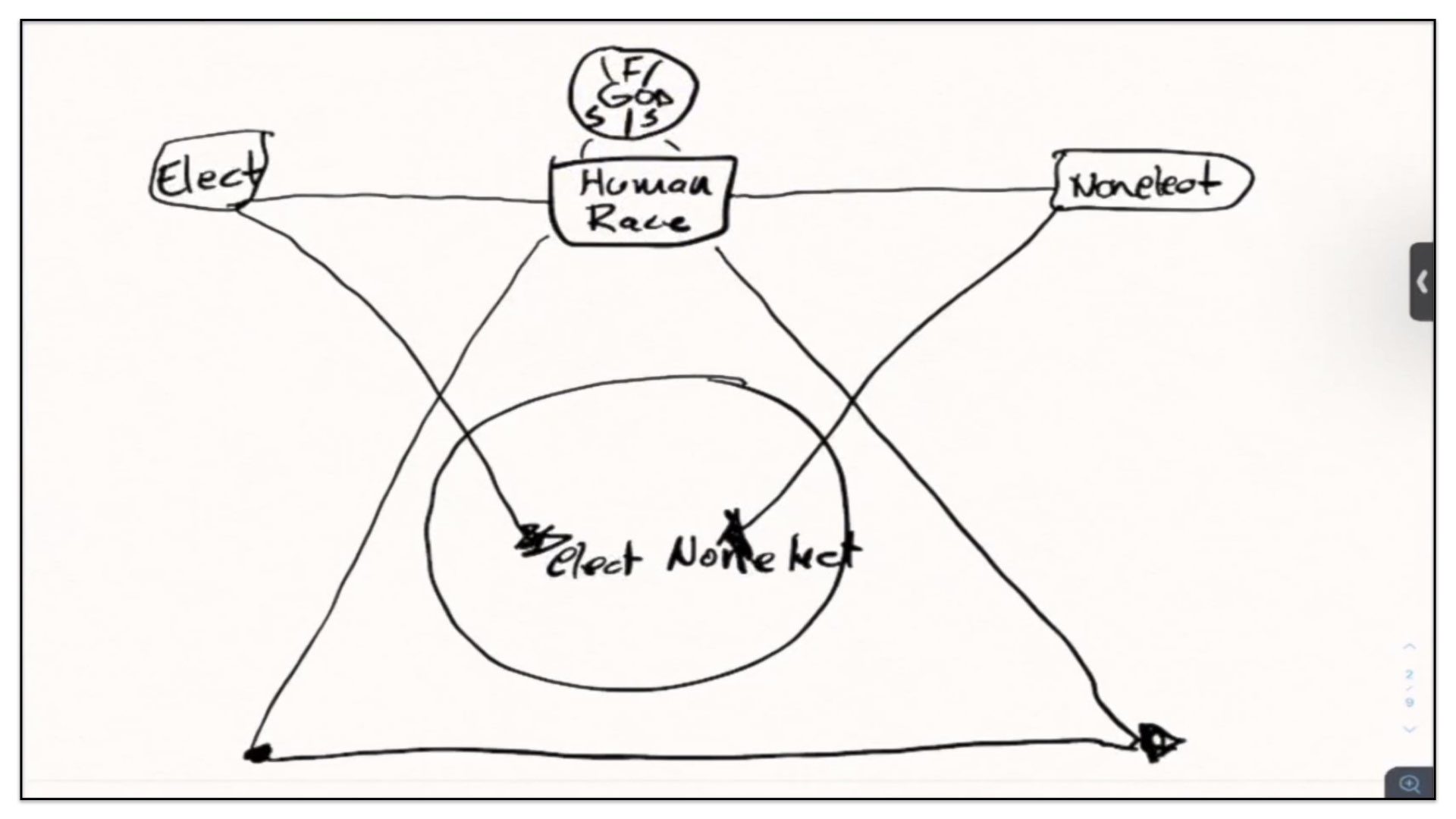
But it’s not all done yet. Let me change the color pen so I can distinguish the notes.
The Covenant Of Works—Sin Is Judicially Imputed (Condemnation) And Spiritually Imparted (Corruption)
We now come to the authority of the relationship. Upon what authority will God establish a relationship a relationship with the human race? Well, we come now to the subject of a covenant. Look, an agreement between two or more persons, with certain obligations binding them together. Every relationship is based upon the authority of a covenant.

And if God is to have a relationship with the human race, it must be based upon the authority of a covenant. And now we have the first of two perpetual covenants running through the course of history. The first of these covenants is called the covenant of works. And it pleaseed God to establish this covenant of works with the first man, Adam. And it was therefore on the heart of Adam that God inscribed a law—what we call the heart law—to love God supremely to love our neighbor as ourselves. And God also appointed Adam to serve as the covenant head for the covenant of works on behalf of the entire human race. That is, Adam would represent both the elect and the non-elect when they come into the world.
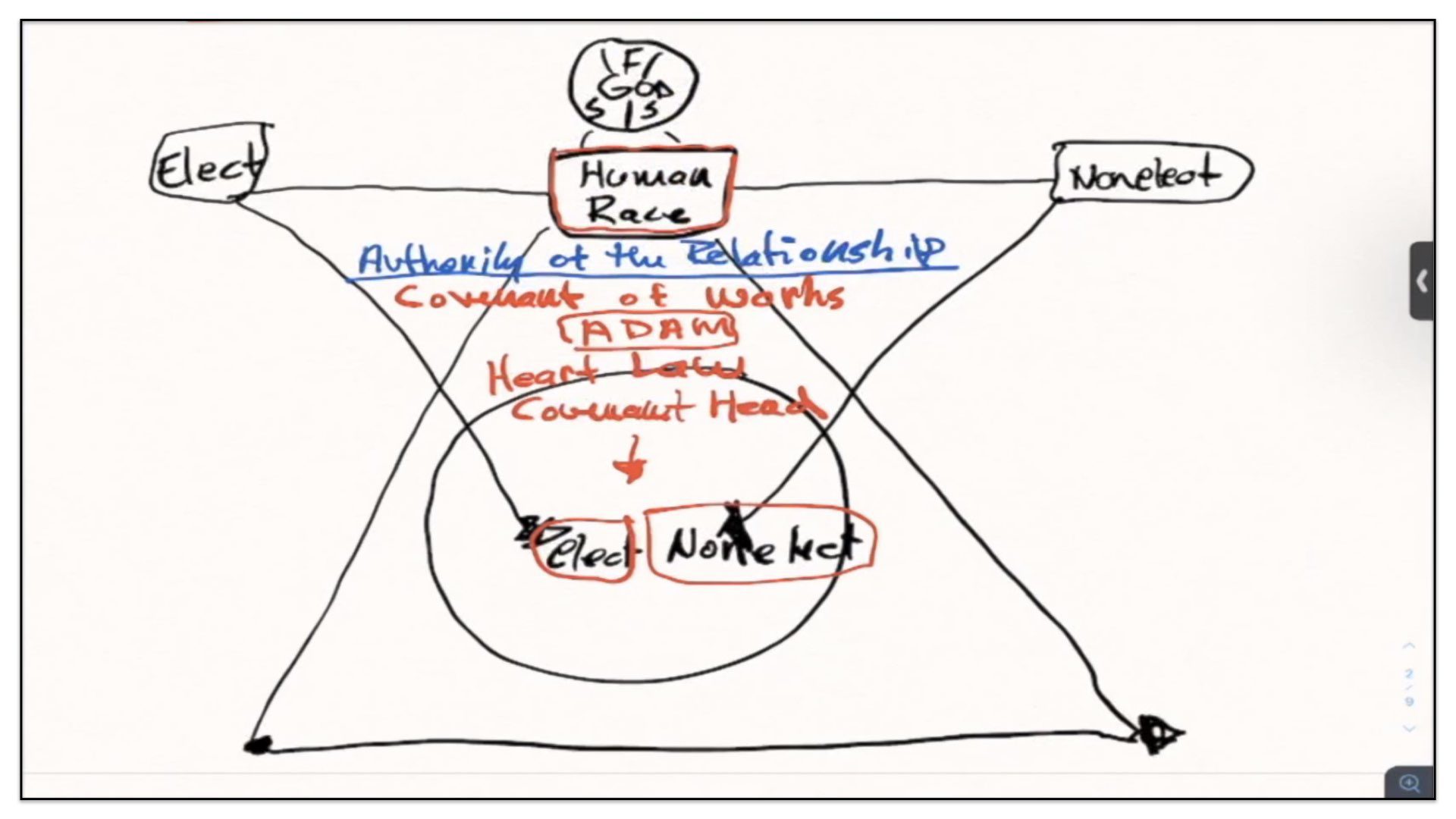
Well, Adam transgressed the law inscribed upon his heart, bringing conflict between himself and God—this was a violation of the Covenant of works. And the result of this—I’ll just change the color pen so I can make some new notes—the result of Adam’s sin was something called judicial condemnation. Adam was now under the wrath and condemnation of God—judicial condemnation. And the second thing which happened is what we could call spiritual corruption—the soul of Adam was now corrupted by sin. And you see, judicial condemnation is what David referred to in Psalm 51 as being conceived in sin; and what he also referred to in the same Psalm as being shaped in iniquity, as it concerns spiritual corruption. These are the two big problems of Adam as a result of his sin. He’s under judicial condemnation and under spiritual corruption. And you see, because Adam is the covenant head for the whole human race, everyone born through the seed of Adam is conceived in sin, meaning they are under judicial condemnation, and they are shaped in iniquity, meaning they are in spiritual corruption. Now, in theological terms, what I’m describing for you is called total depravity. And you see, this renders the entire human race unregenerate—they are in an unregenerate condition. That is the result of sin.
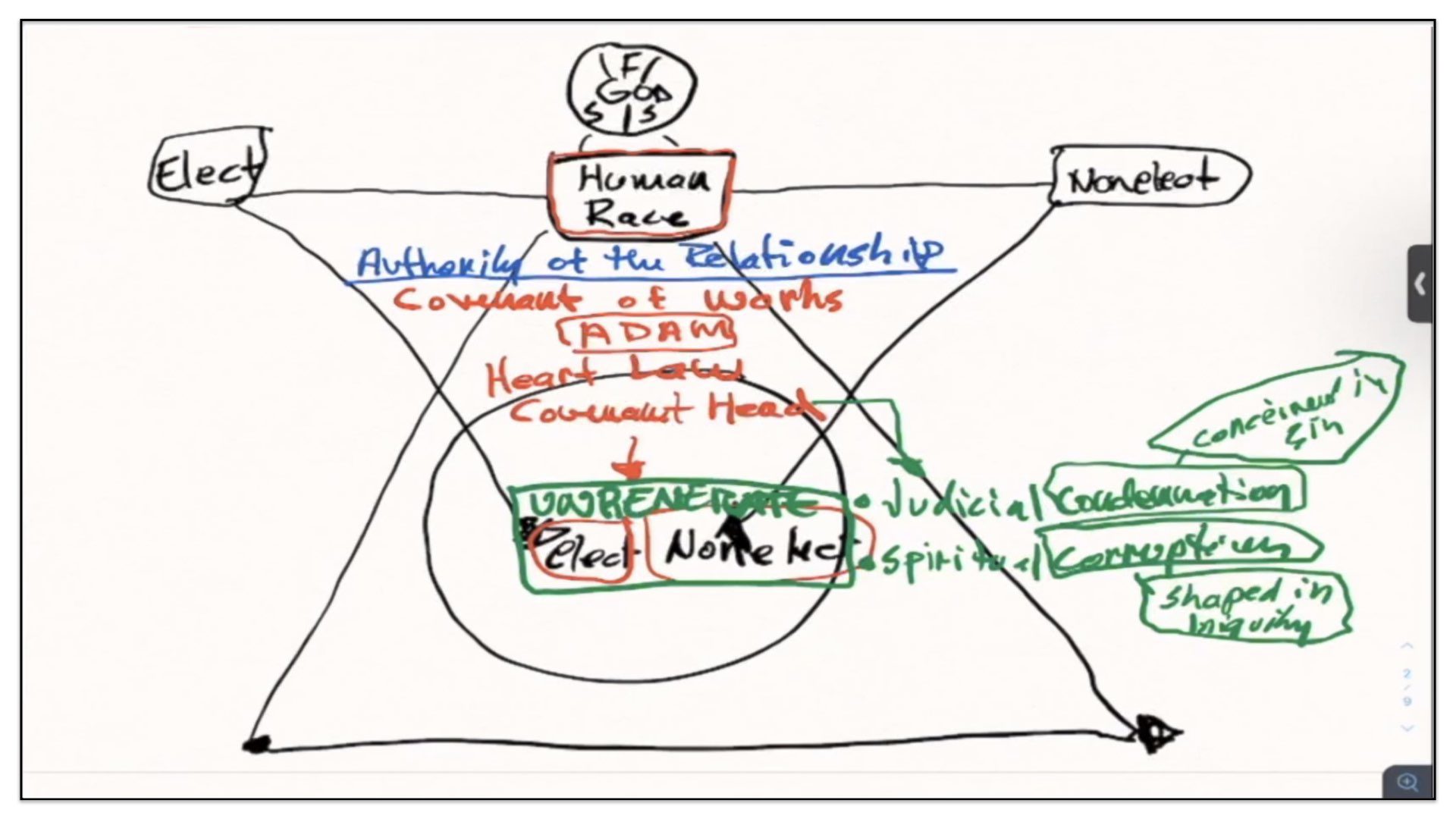
Have you followed so far in the notes? I’m just laying out the framework on what I’m soon gonna be showing you to be the gospel law. But before we get there, we have to have this background. Let me now move forward in the teachings. Watch.
A Plan Of Salvation Devised For The Elect
Remember, everything I’m showing you is just God’s plan from eternity. It actually hasn’t yet occurred. God hasn’t created anything. He’s just putting this into His decree—His plan, His purpose, His blueprints for the ages. So now that God the Father has chosen this to be the course history will take, it pleased the Father to leave the non-elect in their sins, fitting them to destruction. However, because the Father had already set His electing love upon the elect, it pleased Him to devise a plan of salvation for them.
The Redeeming Grace Of God The Son And The Sanctifying Power Of God The Spirit
So the Father did this—from eternity, the Father prepared His elect people unto Glory. And He did this first, by giving His elect people to His Son. We might call this the redeeming grace of God the Son. And then, having given His elect people to the Son, appointing Him to serve as the Mediator and Redeemer, and the Son of God agreeing to affect that work, the Father and Son then gave that same people to the Holy Spirit, appointing Him to serve as their Sanctifier, the great work of the Spirit of God.
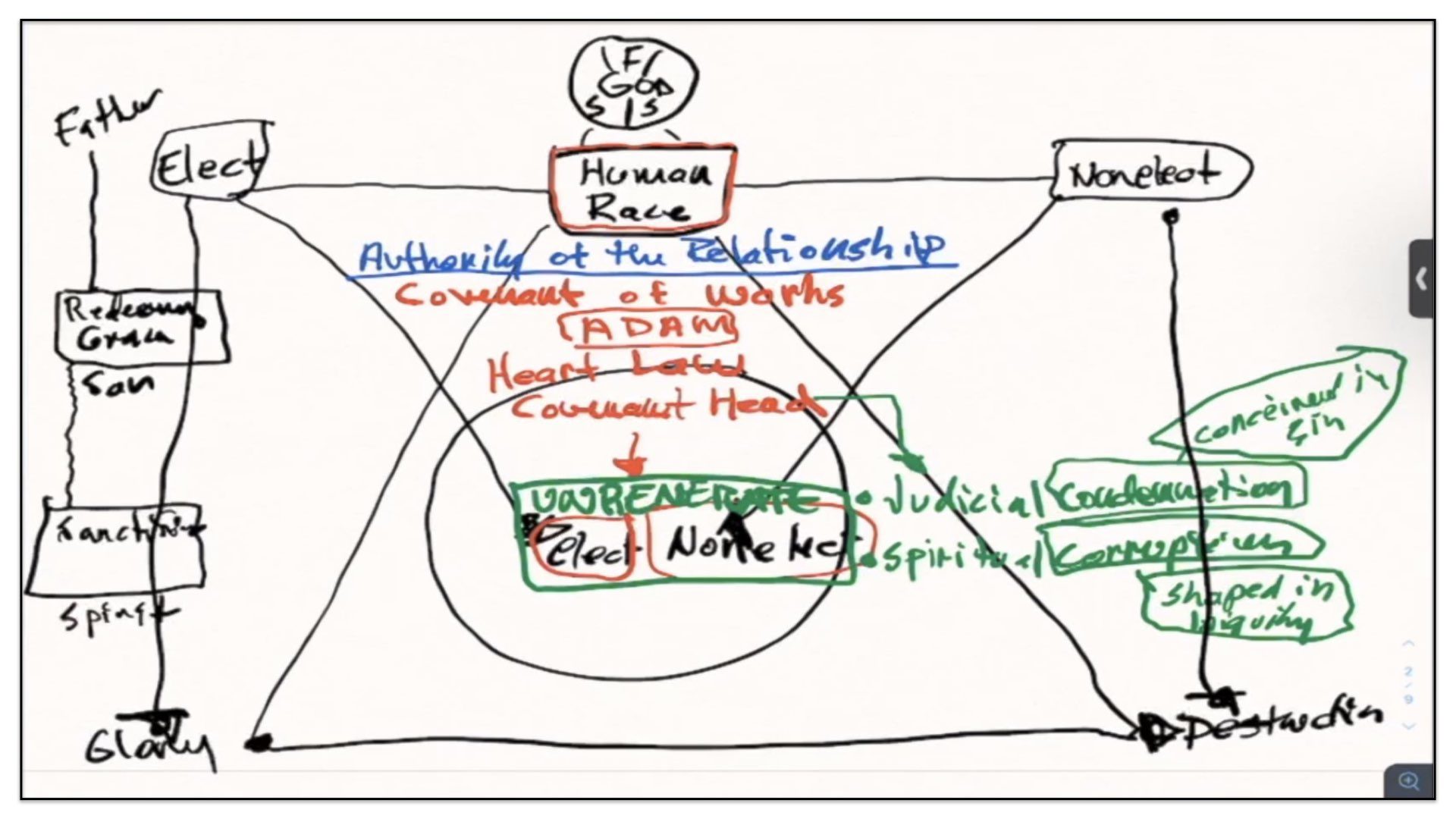
Now watch this, when I said the Father devised a plan of salvation, look at the wisdom of God. How did God solve this problem of sin among his elect people? Well, look at redeeming grace—redeeming grace answers to judicial condemnation. Judicial condemnation is resolved by the justification of God through the redemption that’s in Christ Jesus. That’s the redeeming grace of God the Son. It’s what we call justification.
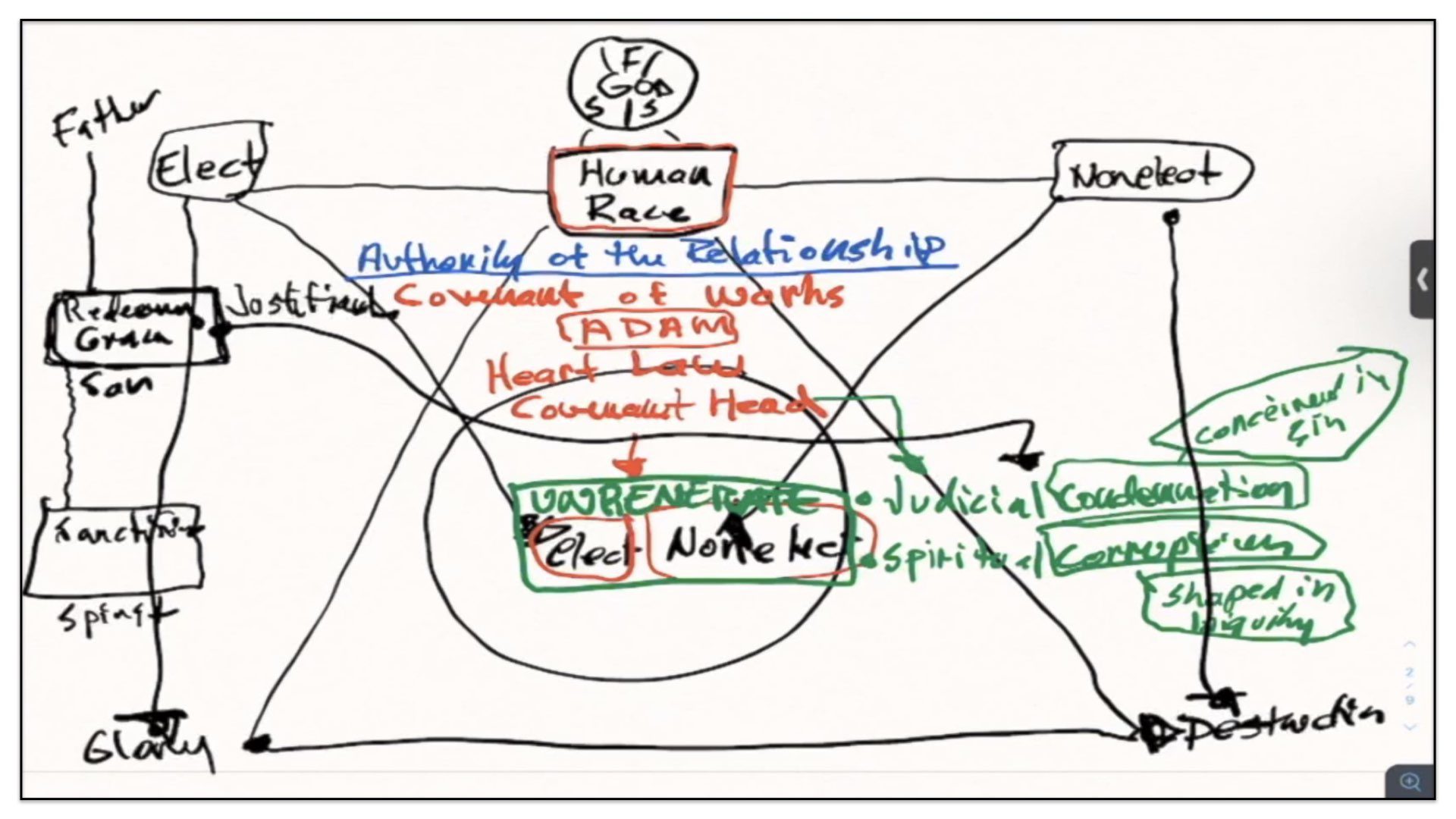
For the second problem—sanctification answers the second problem of sin, spiritual corruption. How can the soul be righteous (holy) when it’s corrupted with sin? And the answer to that is sanctification. And you see, justification is the great work with which God the Son is involved, whereas sanctification is the work that God the Spirit dominates that role, or that work in salvation. And so we have here a full picture both of the problem of a sinner and the answer of God to that problem. Have you followed so far?
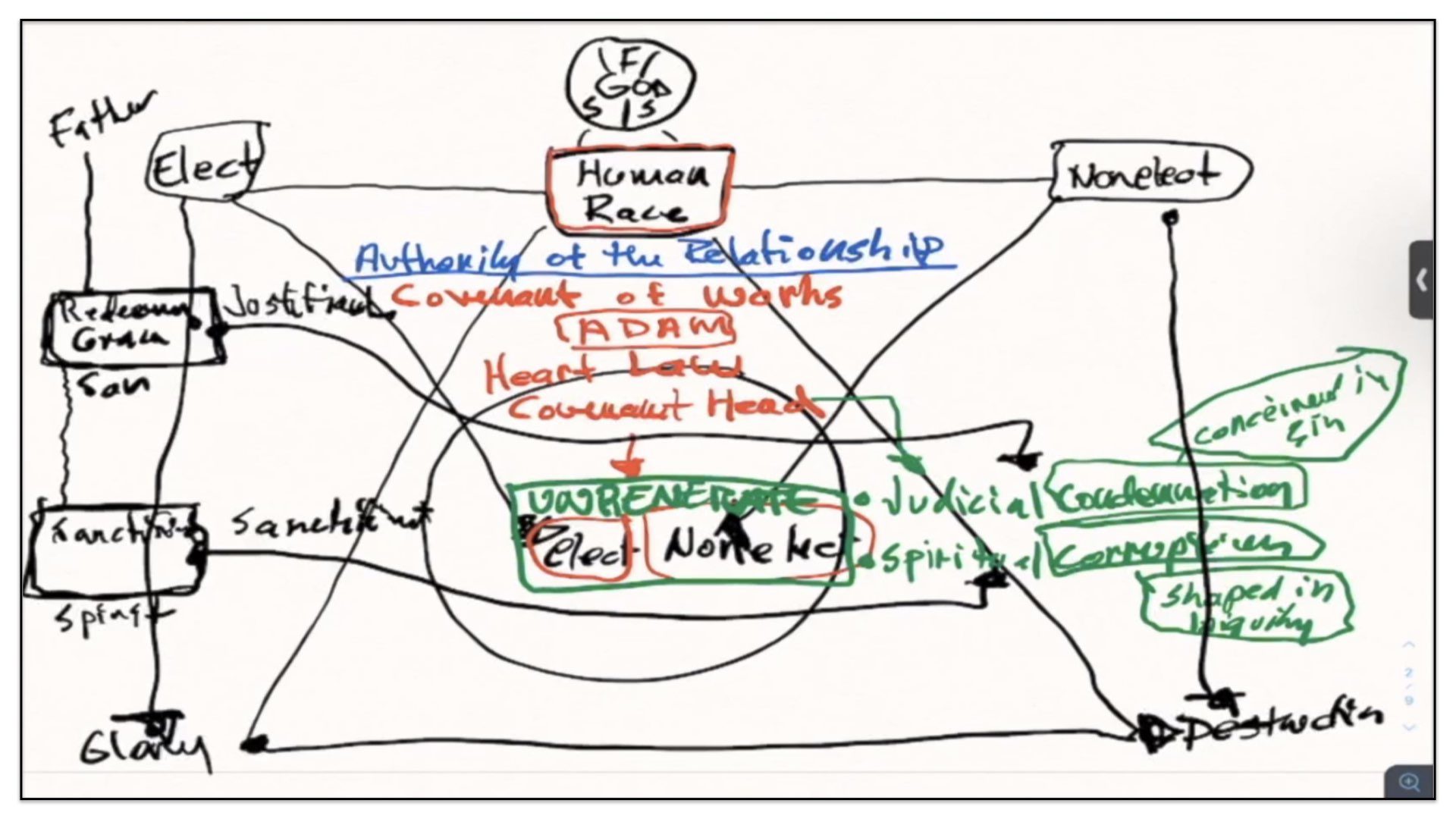
The Gospel Law Is Under The Jurisdiction Of The Covenant Of Grace
Look now, we bring out the gospel law. Watch this. What I’ve just explained to you here, with reference to the Father Son and Spirit in salvation, this is what we call the covenant of grace. A covenant of grace made not between God and the sinner, or God and Adam, but a covenant of grace that is made between the three Persons of the Godhead—the Triune Jehovah. And in particular, Christ is appointed the covenant head for the elect, whereas Adam was appointed the covenant head for the entire human race. Christ is appointed the covenant head for His elect people. And you see, it’s not the heart law that governs those under the covenant of grace, but rather, it’s something called the gospel law.
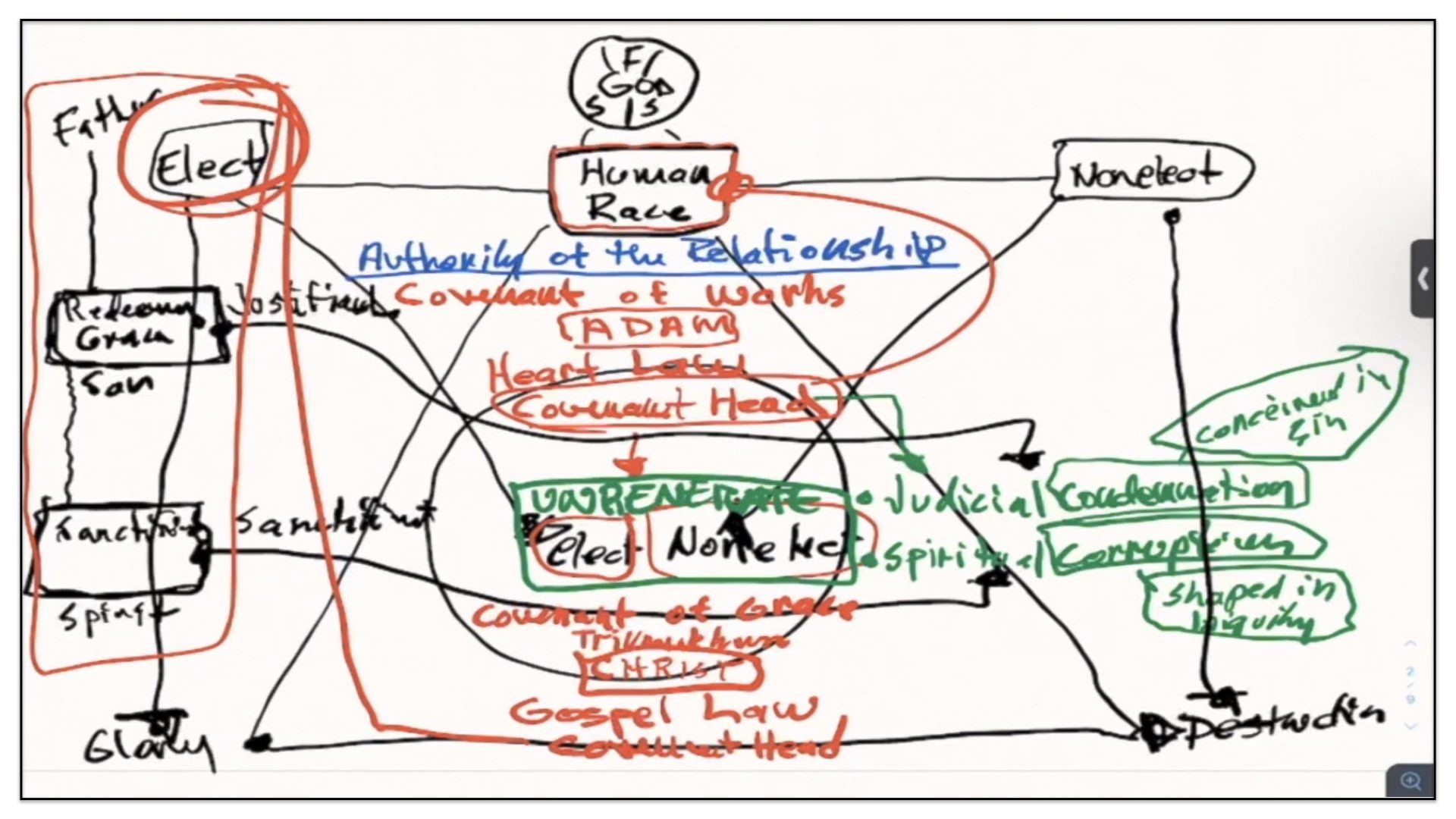
Now, I said earlier every law is under a jurisdiction. Please watch this. It’s very important to see what goes on next. I’ll just change the color pen. Let’s choose orange. Watch. The elect come into this world in an unregenerate condition. But the Spirit of God, at the appointed time in the course of history, will regenerate the soul of those whom the Father has chosen and the Son has redeemed. What is regeneration? Watch, this is the heart of the gospel law now. Regeneration is an operation performed by the Spirit of God upon the soul, whereby He unites the Lord Jesus Christ with the soul—a spiritual union between the soul and Christ. And watch, by virtue of that union, two things are imparted to the sinner. First, the life of Christ—the life of Christ flows into the soul, making the soul alive unto God through Christ Jesus. You see, before the new birth, the soul is dead in trespasses and sins. But as a result of the new birth, the soul is made alive unto God by virtue of that soul’s union with Christ, the life of Christ flowing into the soul. That’s the first thing imparted to the soul. The second thing is what we could call virtues or graces—the virtues of Christ, or graces of Christ—also flow into the soul. What does that mean? The virtues of Christ would be things like love, joy, peace, meekness, long-suffering, gentleness, humility and faith; a thirst and hunger for righteousness, a mourning over our sins, godly contrition, godly repentance; all of these are virtues that flow from Christ into the soul of the one who’s been born again. In so much, that this love, and joy, and peace, and humility, and faith are actually Christ’s love, faith, humility, joy and peace. They’re His virtues. He’s pouring His virtues into us. That is regeneration. And it’s that which enables us to then exercise saving faith in Christ.
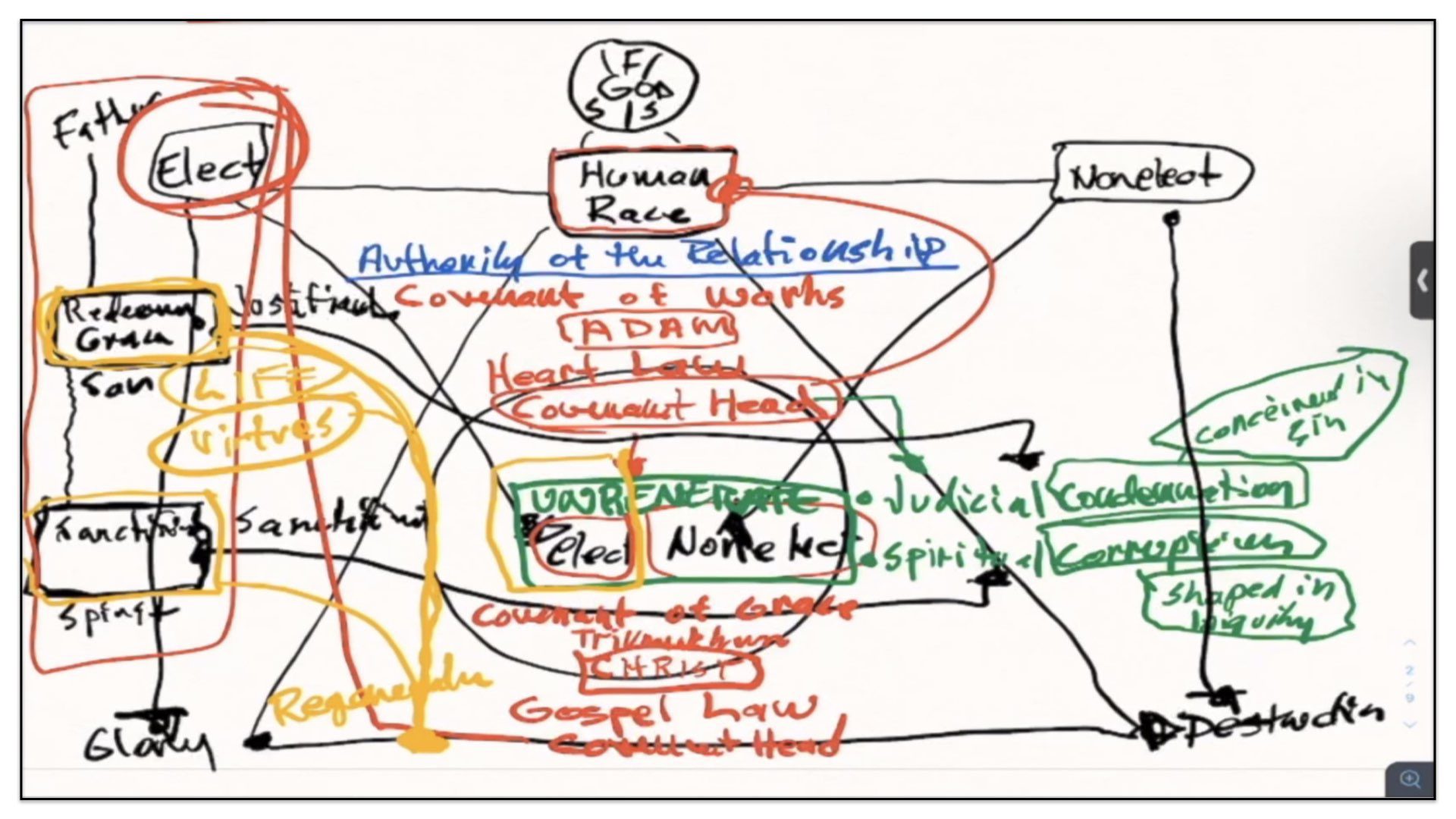
Now you see, many preachers that are High-Calvinists will tell you that faith is a gift from God. And that’s perfectly true. But very few of them will explain how and where that gift is given and comes from. Faith is not like a feather that’s floating in the air that God sends down to us when we’re born again. It’s not some abstract energy or force that’s just imparted to us. No, it’s our union with Christ. And it’s the faith of Christ Himself that’s flowing into our souls. And the faith we exercise, ultimately, is Christ’s faith. He gives that to us. What incredible teaching that is!
Now, that brings me then to say something about the gospel law. What I just explained to you is the gospel law. The gospel law is a living union between the soul and the Lord Jesus Christ.
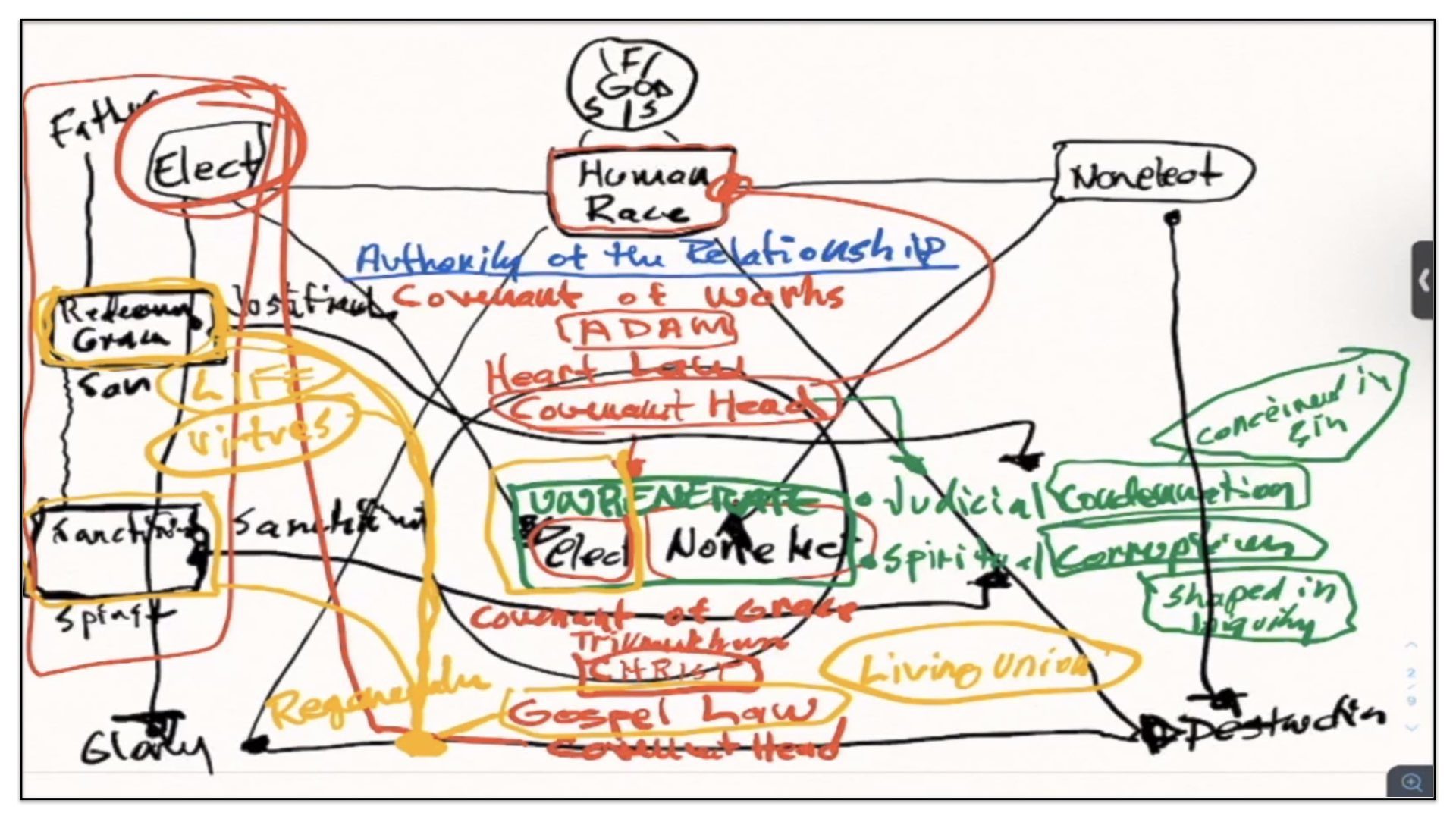
Now, I know the time. I’m almost done but not yet. To wrap this teaching up, let me just add something more to this. Watch. I’m now gonna take the previous views on the laws that supposedly governs the Christian Life and I’m going to compare them to the gospel law. Watch this.
A Comparison Between The Major Views On Which Law Should Govern The Believer’s Life
According to those—here let me just erase some of these things here so I can make space, watch—according to those who believe the heart law or the moral law or Christ’s law (as explained above) in order for those to believe that this is the rule that governs the Christian life—they have to believe that a sinner is born again to walk with God in order that he or she might obey and be righteous according to one of these laws. It’s all about the sinner’s obedience. Whereas the gospel law, the gospel law—choose a different color—the gospel law teaches that when a sinner is born again, by virtue of his or her union with Christ, the life of Christ and the virtues of Christ, flowing into the soul—this living union—that sinner is born again to walk with God according to the obedience and righteousness of Christ. It’s the opposite of the other views. The other views are all about the sinner’s righteousness after regeneration; the gospel law is all about Christ’s righteousness before regeneration and after regeneration.
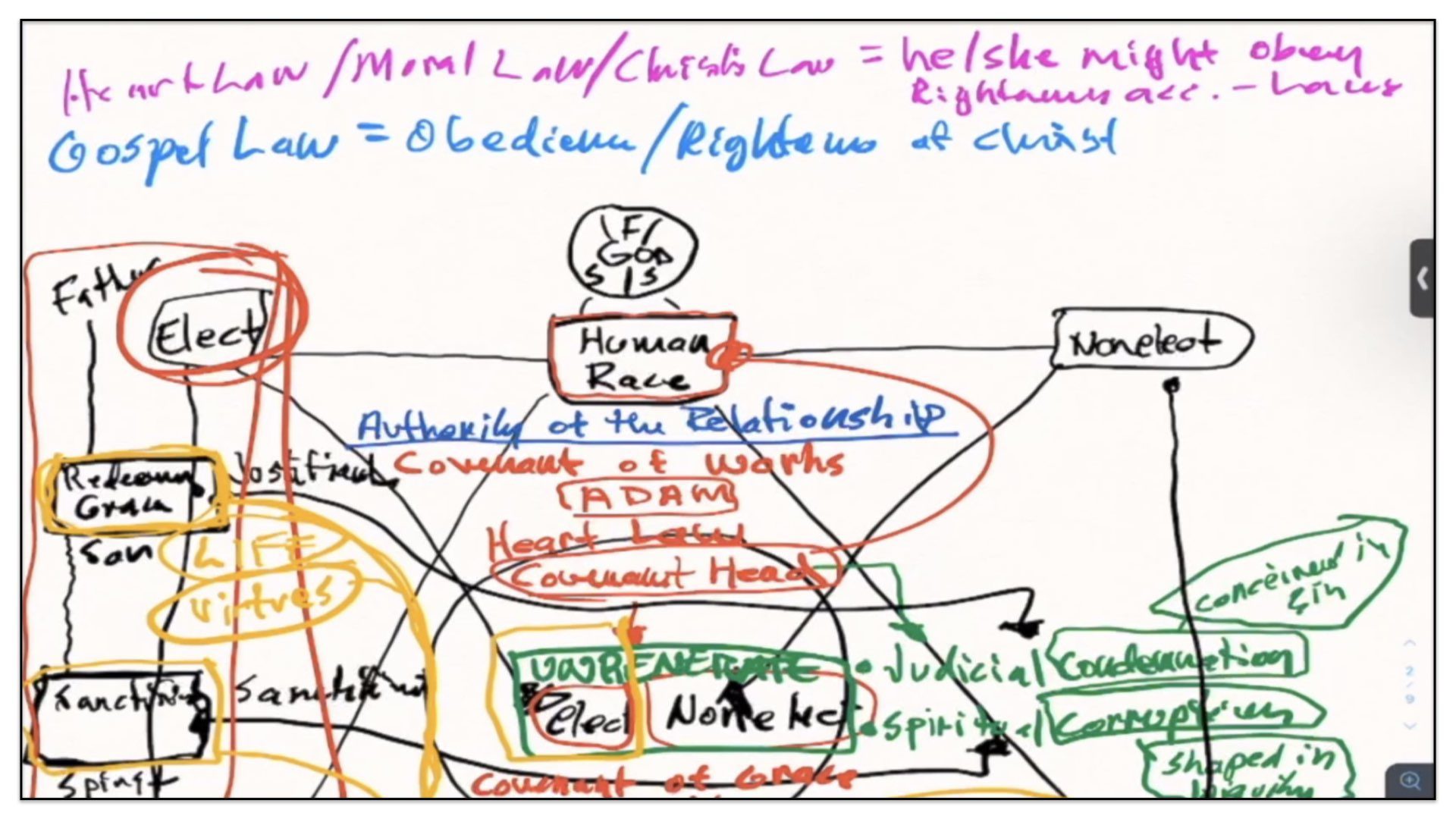
You see, Christ’s obedience and righteousness is true, not only for justification, but for sanctification. In justification the righteousness and obedience of Christ is judicially imputed to the sinner, but in sanctification the obedience and righteousness of Christ is spiritually imparted to the sinner.
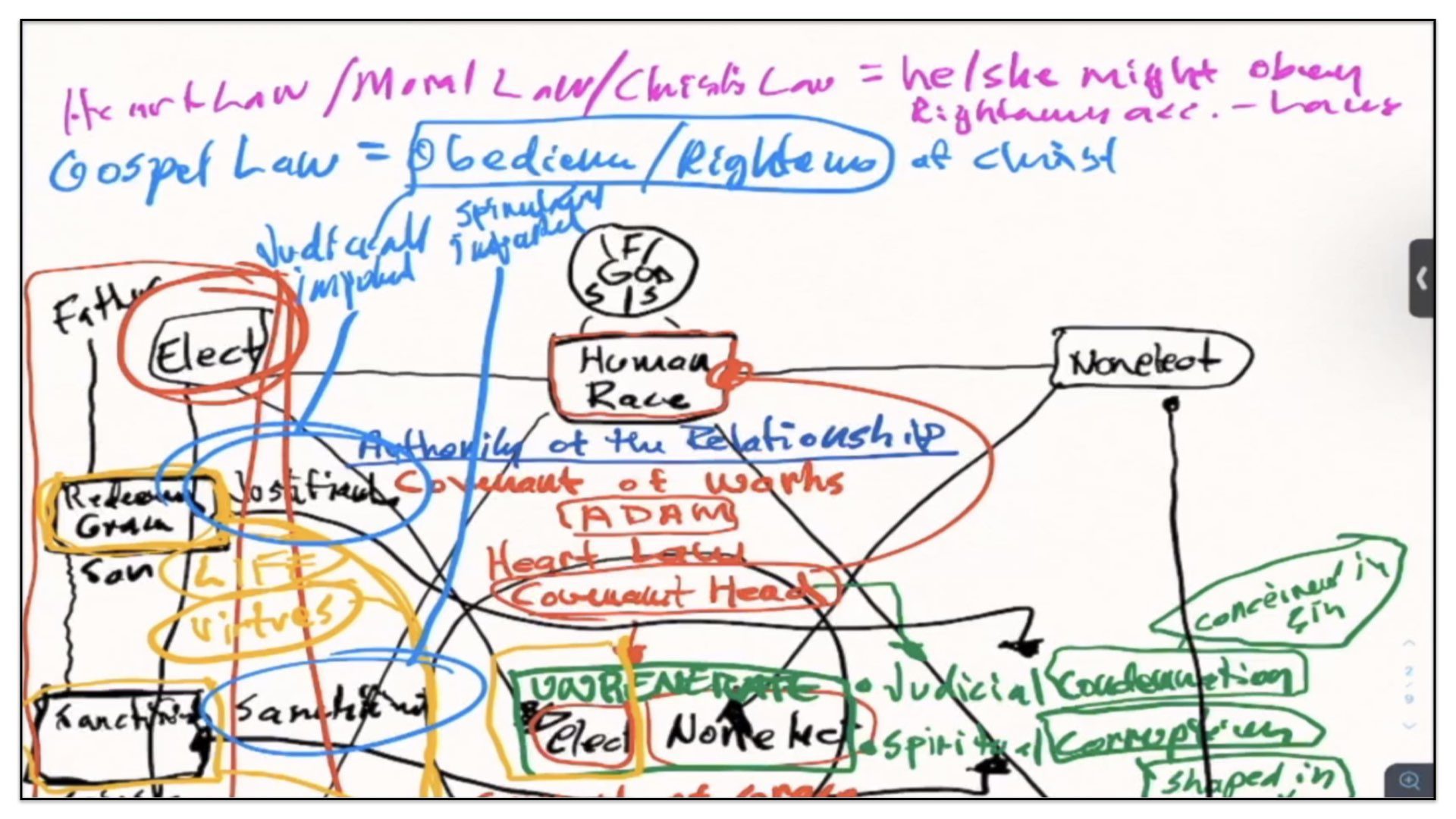
You see, when the soul is united with Christ, the scriptures then speak of a new nature in the soul. It’s a new nature in the capacity of that soul’s union with Christ. And we’re told that the new nature is created in righteousness and true holiness That’s the characteristic of the new nature.
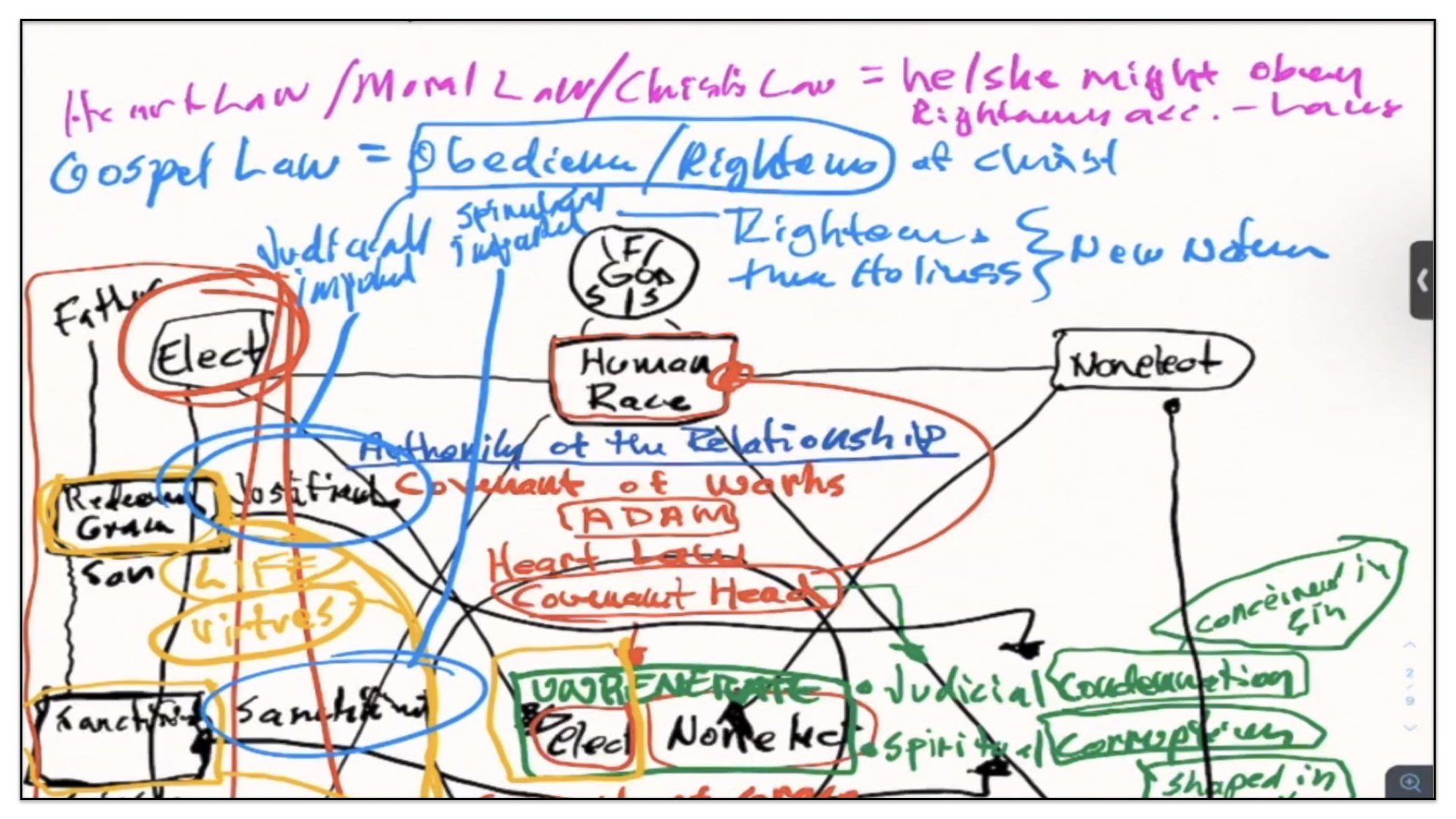
Now you see, in these foregoing views, they believe in something called progressive sanctification. They believe a sinner is progressively becoming more holy, so long as he or she obeys the heart law or the moral law or the laws of Christ. It’s wrong. We believe in something called spiritual growth. Spiritual growth is where the regenerate’s new nature is characterized by righteousness and holiness—that cannot grow or change. One is either completely righteous or unrighteous. There’s no in-between. One is either completely holy or pure or unholy or impure. There’s no in-between. There’s no growth or measurements of that. The soul, the new nature is righteous and truly holy—that’s the character of the new nature. But there is growth. You know those virtues that flow from Christ into the soul—virtues like faith, and joy, and humility and so forth. Those virtues, those graces, are called fruits in the New Testament—the fruits of the new nature. And in that sense, the regenerate sinner is growing in fruit, in the virtues of Christ. The faith is strengthening; the love grows deeper; the humility becomes greater. That is spiritual growth! And that’s what I mean by sanctification, and ultimately that’s what I mean by the gospel law.
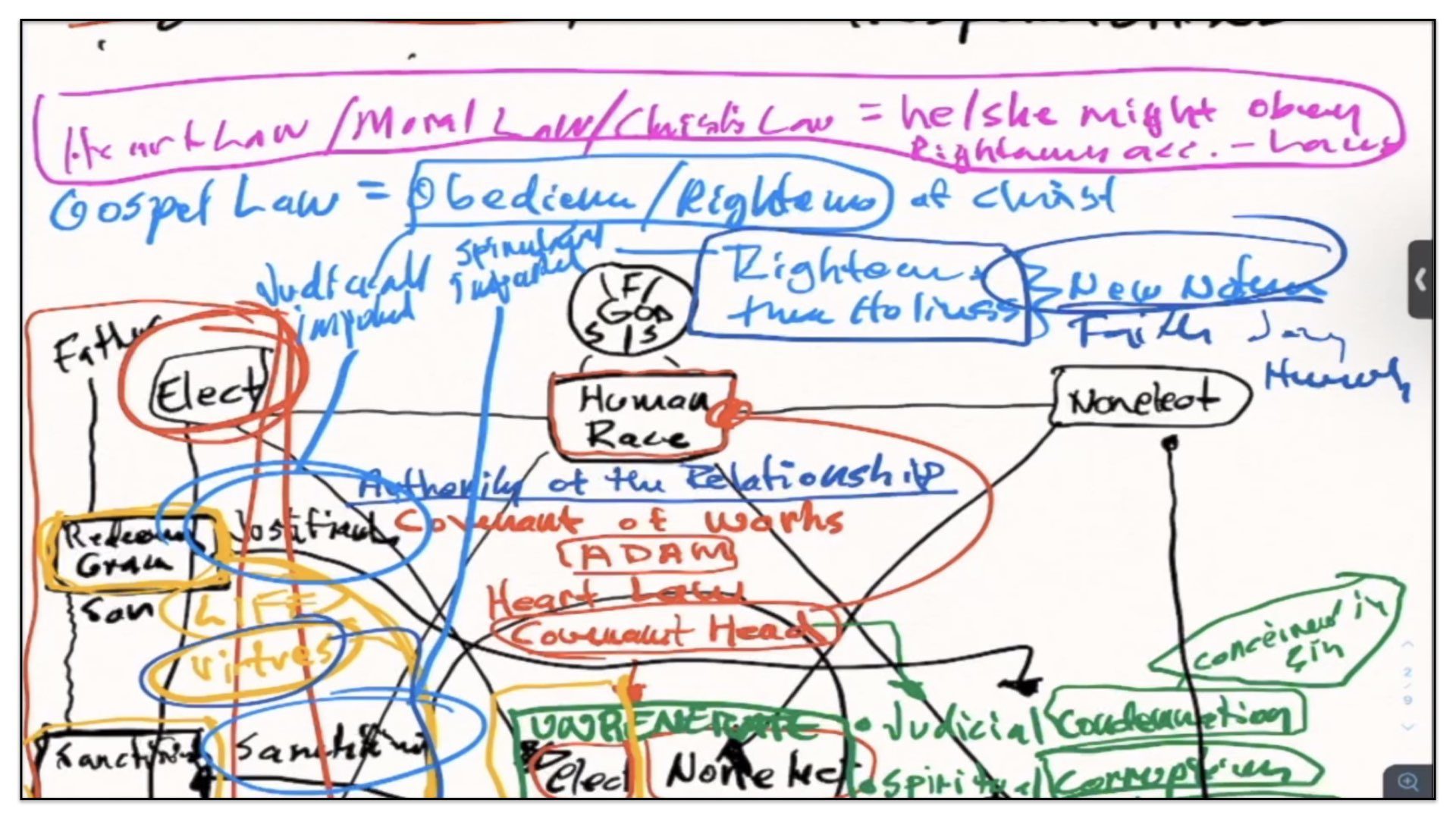
Oh, I haven’t watched the clock as I’ve done this teaching. I could only assume it’s gone quite lengthy. My apologies for being long-winded on some of these things. But I do draw this now to a final word.
A Final Word
I opened the teaching with Galatians chapter 6 and verse 2. I close it with the same—“Bear Ye one another’s burdens and so fulfill the law of Christ.” I believe the meaning of that expression—the law of Christ—is the gospel law. And, to fulfill the law of Christ is simply to live out this new life in Christ—to walk in newness of life—as we are now in union with Christ and His virtues flowing through us.

Well, I can tell you there are things I’ve said in this teaching—while I was teaching—I thought, “Boy, I could have explained that better. I could have used a different expression, a different way of describing it.” But look, it is what it is. I didn’t have time to prep these teachings before giving it to you. I’ve just thought of these things for a couple of days and I’m just giving you my thoughts as I’m teaching it here. So please bear with me if there’s things that I have not explained clearly enough. But I hope what I have given to you as a whole has been useful. You might not share my view on sanctification and what it is that governs the believer’s life, but hopefully it’s been challenging to you—provoking you to think and to consider your own convictions and understanding of these things. Listen, I had planned to share with you a number of other scriptures that refer to the gospel law, but I’m out of time, so next week, when we come together again, I’m going to follow up on this teaching and I’m just gonna highlight for you several other scriptures, which I believe are referring to the gospel law. And when you read those scriptures, in the context to what I’ve given to you here, I really believe it’s going to be a powerful challenge to you and a great blessing and encouragement to your soul.
Well, I wish upon you every blessing in the Lord and I look forward to meeting with you again next week.
Jared Smith served twenty years as pastor of a Strict and Particular Baptist church in Kensington (London, England). He now serves as an Evangelist in the Philippines, preaching the gospel, organizing churches and training gospel preachers.
Jared Smith's Online Worship Services
Jared Smith's Sermons
Jared Smith on the Gospel Message
Jared Smith on the Biblical Covenants
Jared Smith on the Gospel Law
Jared Smith on Bible Doctrine
Jared Smith on Bible Reading
Jared Smith's Hymn Studies
Jared Smith on Eldership
Jared Smith's Studies In Genesis
Jared Smith's Studies in Romans
Jared Smith on Various Issues
Jared Smith, Covenant Baptist Church, Philippines
Jared Smith's Maternal Ancestry (Complete)




